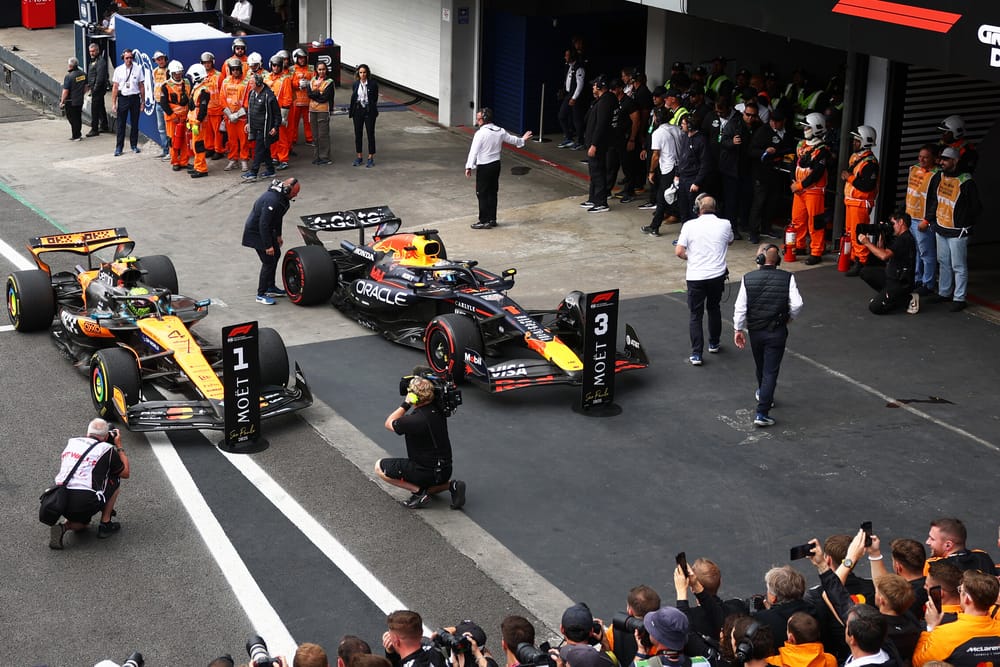Red Bull insists that there was "nothing unusual" in its decision to make a Formula 1 engine change on Max Verstappen's car at the Brazilian Grand Prix in response to McLaren raising questions about it and how it fits within F1's cost cap rules.
In the wake of Verstappen's qualifying disaster at Interlagos a fortnight ago, when he was knocked out in Q1, Red Bull broke parc ferme to make major set-up changes to his car and also opted to make a Honda power unit switch for an added performance lift as it was already taking a pitlane start.
That swap prompted intrigue from McLaren, which has sought clarification from the FIA about whether the Red Bull move has cost cap implications for the team.
The Race understands that there has been no formal answer yet on the matter because the situation falls into a grey area.
When engine changes do and do not count for the cost cap are not explicitly covered in the regulations, and instead they have been based on guidance from the FIA that McLaren believes implies changes for performance gap not to address a reliability problem are cost cap eligible.
A final judgement may well only come when the cost car regulators analyse Red Bull's submission next year.
Red Bull feels, however, that the situation is a straightforward one, as it claims it is not shocked that McLaren has stirred things up.
Chief engineer Paul Monaghan said: "I'm not surprised someone has to sort of roll a hand grenade into the situation. Fine. If the situation were around the other way, we could do the same.
"What we did is defendable, it's legitimate and if you go back through, even this generation of cars from say '22 to this year, people have made engine changes. There's nothing unusual in it."
Although McLaren is not alone in feeling that the engine change situation is not totally clear, Red Bull thinks there is no uncertainty about what it did.
Monaghan added: "I don't think it's a grey area. As far as I'm concerned, we justified to ourselves what we were going to do. If we're questioned on it, fine, we will justify it."
Asked by The Race if Red Bull's interpretation was that the engine swap was inside or outside the cost cap, Monaghan said: "I'm not going to answer that question because I'm not a finance regulation expert. I know roughly what we need to do and what's in and what's out.
"But I believe our actions we can defend, and there will not be a penalty against us at the end of the year for it.
"That would be an answer with my knowledge on it. I don't want to speculate as to how we're treating it within the financial regulations, because I may get it wrong and then I look even more of an idiot than normal. So I'll leave it at that, if I may."
Red Bull says that the engine that was taken out of Verstappen's car in Brazil could still be brought back into action if necessary, but only if the team was forced to do so.
McLaren's customer team limit
While Red Bull is confident that what it has done on the engine front will not have financial consequences, rival McLaren thinks it is in a different situation.
As a Mercedes customer team rather than a works outfit, it has limitations in being able to make changes for performance reasons, because it has to pay for any replacement engines in such circumstances.
McLaren technical director Neil Houldey explained: "We are in a bit of a different position. We can't take a performance engine change because we are not a works team who have a PU [power unit] supplier who's happy to supply those engines free of charge.
"It is definitely something that a works team can use, that someone like us, who is purely independent, cannot take advantage of."
The FIA has changed its approach with regulations for next year, as there are more restrictions in terms of the cost cap - and especially because they cover power unit expenditure. This will help avoid a repeat of the debate over what Red Bull has done.
Houldey added: "Obviously, 2026 is quite different as the PU cost cap comes in.
"But certainly, and you've seen it all the way through this year and through previous years, works teams have an advantage over customer teams because of the lack of regulation."



